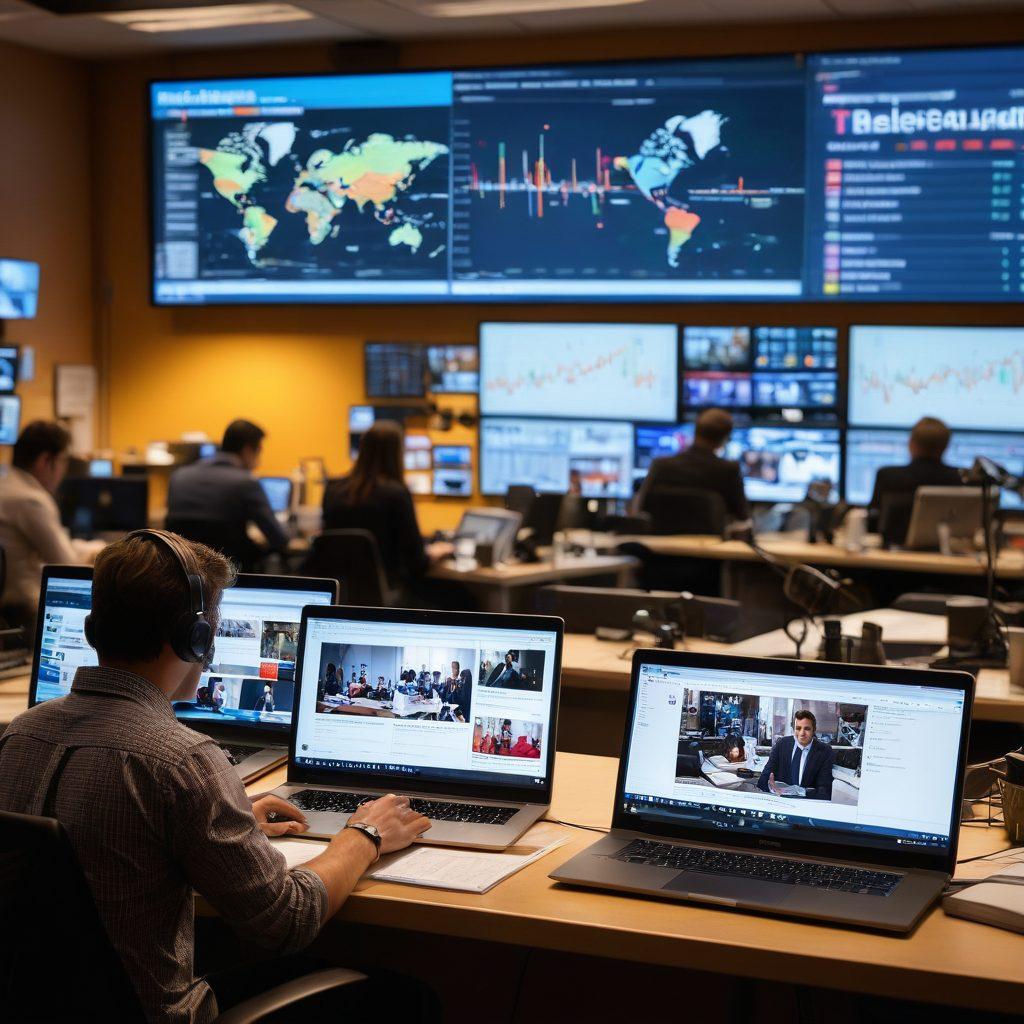Empowering Your Voice: The Role of Digital Media as a Modern Protector of Truth
In a world where information flows at lightning speed and where headlines can shift perceptions in the blink of an eye, digital media has emerged as our steadfast protector. But how do we harness its potential truly? As a modern-day sentinel shielding truth from the chaotic winds of misinformation, digital media offers us a space not just for consumption but for advocacy. It serves as our watchful watchdog, guiding us through the tumultuous landscape of data overload while ensuring that authentic voices are amplified and that the pursuit of truth continues relentlessly.
Imagine scrolling through your news feed and pausing at an online journal that cuts through the noise. You find a piece of investigative journalism that unravels hidden truths or reports on trending news with a deft touch of storytelling. It beckons you to explore deeper, igniting that spark of curiosity within. At this very moment, digital media doesn’t merely serve as a passive platform; it transforms into a dynamic news platform—a space where informed opinions and expert insights intermingle, fostering an environment ripe for discussion and discourse. Have you ever pondered how many stories remain untold simply because the platform isn't there to shed light on them?
As we engage with feature articles, editorials, and social commentary, we empower ourselves with knowledge. Those compelling narratives hold the power to shape our perspectives. They challenge our beliefs and invite us to reconsider our stance on various issues. With the multitude of channels available in the vast digital landscape, each reporting entity carries the responsibility of serving the community with diligence. This is where the role of news analysis and commentary becomes crucial—guiding the audience in interpreting the stories behind the headlines, encouraging us all to reflect: Are we merely consuming content, or are we engaging with it as responsible citizens?
Furthermore, the role of lifestyle blogs cannot be underestimated in this equation. They too have evolved, adopting a significant role in shaping social commentary and providing thought leadership. From discussing environmental issues to exploring the nuances of mental health, these platforms present an opportunity to voice concerns, document experiences, and ultimately push for change. Have you ever come across a blog that resonated with you on such a personal level that it prompted you to take action?
Ultimately, harnessing the potential of digital media lies in our willingness to engage, question, and demand accountability. As we navigate through news updates and seek out diverse media outlets, let’s remember that we have the power to hold those in authority accountable and keep them transparent. Each choice we make, from which article we click to which opinion we share, contributes to a larger narrative—a narrative that can either empower truth or propagate falsehoods. So, how will you harness digital media in your journey for truth today?
The Watchdog Era: How Online Platforms Foster Informed Opinions
In a world where information is at our fingertips, one might wonder: how do we distinguish between fact and opinion? This is where digital media emerges as a powerful protector of truth, acting as a sentinel in the endless flow of information. The open-access nature of online platforms allows us not just to consume news updates but to engage critically with them. The era of the watchdog is upon us, and with it, we've seen a surge in online journals and media outlets that prioritize informed opinions and investigative journalism, guiding us through the often tumultuous seas of trending news.
Think about the last time you stumbled upon a thought-provoking article on a lifestyle blog or an in-depth feature article that shifted your perspective. These content hubs provide rich grounds for social commentary and discussion, fostering not just passive reading but active engagement. Digital media today plays a dual role as both a source of information and a training ground for media literacy, essential skills in navigating our modern information ecosystem. How often do we stop to question the integrity of the news platform we're engaging with?
What’s particularly compelling about online platforms is their ability to catapult expert insights into the public discourse. Editorials and commentary pieces that dissect current events encourage critical thinking and deeper understanding. The accessibility of these forms of journalism empowers everyday individuals, providing tools to form informed opinions grounded in thorough news analysis. It’s more than just reading headlines; it's about deriving meaning from comprehensive reporting—a skill essential for today’s discerning consumer of news.
As we move further into the digital age, the importance of diverse voices cannot be overstated. Look at platforms that champion investigative journalism and where citizens can report on grassroots issues. These media outlets act as watchdogs, holding the powerful accountable and shining light on stories that mainstream media might overlook. This continual evolution of digital media as a protector signals a significant shift towards democratizing knowledge and amplifying unheard voices. Are we ready to embrace this responsibility?
In closing, the era of the digital sentinel not only connects us to immediate news updates but also challenges us to think critically about what we consume. Through feature articles and investigative reports, we become active participants in our communities. Let us not only consume but also contribute to the narratives that shape our understanding of truth. When was the last time you shared an article that influenced you? Perhaps it’s time to step into the role of both informed reader and thoughtful contributor in this vibrant landscape of digital discourse.
From Investigative Journalism to Editorial Insight: The Power of Digital Reporting
In an age where information travels at the speed of light, digital media has emerged as a formidable protector of truth. Gone are the days of waiting for the morning paper to get the latest updates; we are now enveloped in an endless stream of news updates on our smartphones and computers. But with this technological surge comes a heightened responsibility. Amid misinformation and sensationalism, can digital platforms truly serve as sentinels of truth? This question has never been more crucial as investigative journalism pivots into the online realm, providing us with insightful analyses and the kind of robust reporting we need to navigate our complex world.
Digital reporting today encompasses a wide array of genres from hard news to feature articles, offering something for everyone. Whether you're tuning in for the latest trending news or diving deep into a lifestyle blog that blends social commentary with expert insights, there's a wealth of content just a click away. Platforms that once limited their offerings have transformed into comprehensive news outlets, engaging audiences with editorials and commentary that provoke thought and inspire dialogue. How does one sift through the noise to find powerful, credible voices in this digital cacophony?
Picture this: a young journalist armed with nothing but a laptop and a burning desire to uncover the truth. In the past, they might have faced insurmountable obstacles, but today, digital media democratizes reporting like never before. Investigative journalism can now flourish in the form of online journals and news platforms, allowing for fresh perspectives and creativity. The real power lies in these journalists becoming watchdogs who hold the powerful accountable and shine a light into the shadows. Isn't it inspiring to think that anyone, anywhere, can launch an investigation and share it with the world?
The magic of digital reporting lies not only in its accessibility but also in its capacity to foster informed opinions and thought leadership. It encourages conversations among readers and writers, creating spaces where ideas can be exchanged freely. Imagine engaging in discussions about serious issues over a Twitter thread or discovering an editorial that challenges your viewpoint. This active participation gets us all involved in the continuous battle for truth. So, how often do we take the opportunity to add our voices to the dialogue in this bustling digital ecosystem?
Ultimately, the role of digital media as a modern protector of truth extends beyond mere news reporting. It is about empowerment — empowering both journalists to pursue stories that matter, and the public to seek out diverse perspectives and articulate their own thoughts. As we navigate this information-rich landscape, we must embrace our role as active participants in the process. In doing so, we transform digital media from a passive consumption tool into a dynamic platform for meaningful engagement. Are you ready to lend your voice to the chorus of informed discussions and insights today?


